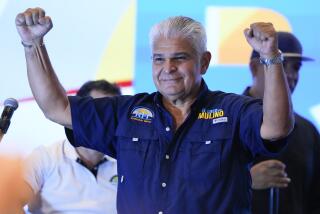The Joy of Another Dictator Going
- Share via
Among all the nations that have stepped from under tyranny’s shadow over these last few bracing months, the sight of Chile’s emergence into the light of freedom should be a source of special pleasure to Americans.
Chileans are a resourceful people with a well-developed tradition of electoral politics. However, from the era of the nation’s 19th-Century liberator, Bernardo O’Higgins, to our own, the democratic and reformist proponents of that tradition have had to contend with intervals of nationalist and military usurpation. The most recent such interlude--the regime of dictator Augusto Pinochet, who came to power in a U.S-backed 1973 coup--has been particularly wrenching. As many as 1,000 people were killed in the initial fighting and more than 1,500 disappeared during the repression that lasted until 1977. Since then thousands have been unjustly imprisoned; many of them were tortured.
Patricio Aylwin, the Christian Democrat inaugurated Sunday as Chile’s democratically elected president, inherits South America’s healthiest economy and the thorny issue of how to deal with the martial plutocrats who have tormented his country for nearly 20 years. Wisely, he has granted amnesty to “prisoners of conscience” and promised a thorough legal review for all those jailed by Pinochet. The former dictator, who still commands the armed forces, has warned: “I will be watching and listening, because we must not allow any abuse in the name of freedom.”
Washington, too, should be watching. Having blundered once into complicity with Chile’s oppressors, the United States now should stand ready to support its liberators.
More to Read
Sign up for Essential California
The most important California stories and recommendations in your inbox every morning.
You may occasionally receive promotional content from the Los Angeles Times.













